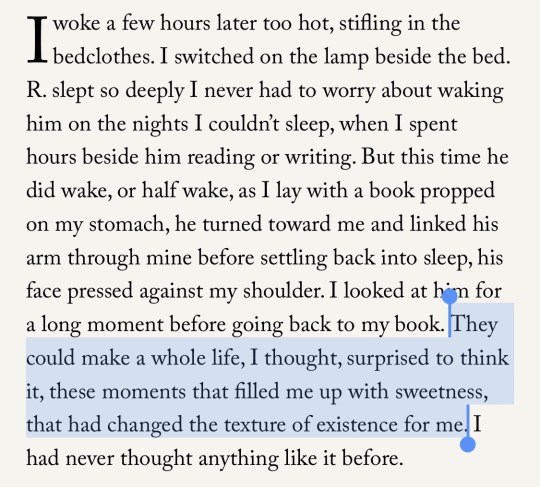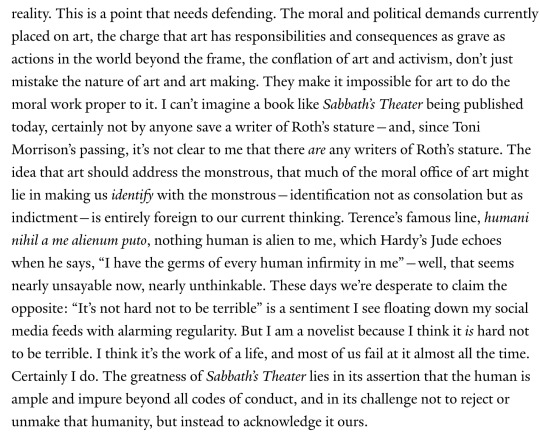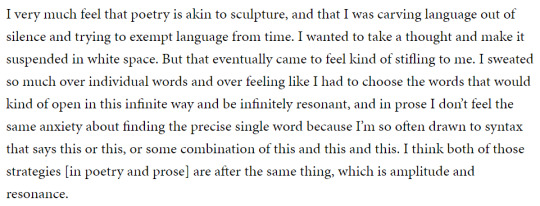#Garth Greenwell
Text

Garth Greenwell, “The Frog King” [ID in alt text]
2K notes
·
View notes
Quote
The writer in America has been professionalized to a perilous extent. I don’t think great art is likely to be made by professionals. I think it’s more likely to be impeded by the demands and values of professionalization. The ideal development of the artist is libidinal, I think, spurred not by the demands of the academy or the world of professional publishing, but by the imperatives of desire, by seeking out complicated pleasures.
Garth Greenwell, interviewed in The Paris Review
248 notes
·
View notes
Text
Never before had I met anyone who combined such transparency (or the semblance of transparency) with such mystery, so that he seemed at once overexposed and hidden behind impervious defenses.
What Belongs to You by Garth Greenwell
#what belongs to you#garth greenwell#quote#literature#aesthetic#books#dark academia#light academia#lgbtq#queer literature#queer#on bearing witness#on being seen#perception#lgbtq literature
14 notes
·
View notes
Text


great fucking essay by garth greenwell on sabbath's theater (my personal favorite roth) & what we define as "moral engagement" in art
#this entire blog has secretly been a psyop to get people into roth novels#philip roth#sabbath's theater#garth greenwell#the sex scene where they piss on each other is actually the best thing i have ever read. one moment you're shocked and the next SOBBING
18 notes
·
View notes
Photo

Garth Greenwell
28 notes
·
View notes
Text

from Cleanness by Garth Greenwell
#now reading#oh my god oh my god oh my god (puts my face in my hands)#took me an embarrassingly long time to get to this book despite adoring What Belongs To You. really glad i’m reading it now#garth greenwell#fiction
14 notes
·
View notes
Photo

Garth Greenwell, author of Cleanness and What Belongs to You, in “ Dialects of Desire,” an interview with Amy Gall published in January 2020.
#Garth Greenwell#Cleanness#What Belongs to You#Fiction#Poetry#Inspiration#Quotes#Writer's Life#Writer's Block#Queer
38 notes
·
View notes
Text


garth greenwell - cleanness
dennis cooper - closer
7 notes
·
View notes
Quote
But this is a story you are telling yourself, I said, a story that will make you unhappy…There’s nothing inevitable about it, it’s a choice you’ve made, you can choose a different story.
Garth Greenwell, Cleanness (Farrar, Straus and Giroux, January 14, 2020)
18 notes
·
View notes
Text
And he didn’t just pull me to him, he rolled back as well; I had kept a space between us but he pressed against me, the whole length of his back against my front. I tightened my arms around him, holding him as he wept, and he reached one of his legs through mine and pulled me tight, so that I felt his body all along my own, his body that had been, in however partial or compromised or intermittent my fashion, beloved to me. As I pressed my face to his neck and breathed him in, his scent sour with sweat and alcohol, it seemed impossible it could dissolve, simply dissolve, this form I had known so intimately with my hands and my mouth, it was unbearable that this body so dear to me should die.
from Garth Greenwell, What Belongs to You (2016)
1 note
·
View note
Text
As there was for me, the intense pleasure I’ve never been able to account for, that can’t be accounted for mechanically; the pleasure of service, I’ve sometimes thought, or more darkly the pleasure of being used, the exhilaration of being made an object that had been lacking in sex with R., though that had had its own pleasures, pleasures I longed for but that had in no way compensated for the lack of this. I want to be nothing, I had said to him, and it was a way of being nothing, or next to nothing, a convenience, a tool.
Garth Greenwell, “Gospodar.”
2 notes
·
View notes
Text
a responsibly equivocal stance
Max Norman's review of Diane Arbus's work in The Drift brings together some questions I've wrestled with lately, as I always wrestle with them: the questions of having a position on an artist and having complex assessments of art. Some of this is triggered by the experience of watching some friends of mine process the Oscars and the sweep made by Everything Everywhere All at Once—a therapeutic millennial movie that seems to want to palliate viewers' childhood wounds by using larger-than-life spectacle as a vehicle for overly simplified sentiment, and is being disproportionately rewarded considering its ultimate lameness (the natural product of excessive spectacle for those who don't find that charming) and conservatism. (The case for the conservatism is laid out quite well by Kieran McLean, here.) Versus the kind of artwork that tries to be several things at once, say TAR.
Which everyone online seems to be kind of stupid about? Much of this is likely shaped by Twitter's particular economy of terse opinions, quote tweeting, and dunking. Versus, say, an ecosystem of alt-weeklies or blogs issuing comparatively considered pieces (written by critics of whatever stripe, and not Twitter-posting Substackers, each hanging out their own little shingle, subjected to the demands and incentives and scale of those platforms), which people then reflected on via comments in comment sections—which is not to glamorize blogs or comment sections, just to say that what we've got now might be worse than what we had then. With TAR, it feels like a film that was designed to be ambiguous enough to evoke multiplicity in its interpretations just got such flat reads from people whose tastes I normally trust. It was a portrayal of an abuser in cancel culture being justly punished for her arrogance. Or it was a portrayal of an abuser being unjustly punished, because according to Todd Field, Lydia Tar's genius, or her age and socialization to older mores, or the perceived stupidity of her antagonists in the culture—for all that I don’t think the student she argues with, in a moment that goes viral and begins her fall, Max, is actually meant to be seen as stupid—ought to have excused her bad behavior.
To my mind, the film seemed to want to do both these things—or, as the memes would have it, a secret third thing, some hybrid of the two.
It seemed Field wanted to show a person whose character has been dessicated by the pursuit of fame experiencing the destruction of all her ties to the world that satisfied her desire — perhaps even to get back in touch with some new form of creation both degraded and genuine. Yes, Tar, at the end of the film, is in an objectively worse position than when she began. And she's not exactly saved. She may not be capable of any reckoning with herself more concrete than the atavistic, overwhelming stab of feeling that makes her vomit when she's confronted by a reminder of the women she worked to manipulate, like Krista and Olga, in the form of the girls in the spa she visits, lined up like a banquet for her delectation. She's also conducting in a meaningful way, absorbed in the act of it, in a way she has not been up to that point. And she is so because now, she has no other choice...
All this is to say: maybe Field wanted to create an object that could meaningfully be taken several ways. Maybe he meant us to go back and forth on whether Tar is right or Max is right, or to what degree; maybe he meant us to like Tar in some ways, or to find her charismatic or funny in fucked-up ways, and to disapprove of or hate her in other ways, to find her blinkered and odious and sad in her attempts to aggrandize herself. All this is so very basic to say, and I don't mean to imply I'm being radical here, but I have had this thought: maybe we're fucking up by being so insistent with how we feel about this movie and what we think it's saying About The Culture We're In. Artists shouldn’t be expected to have a single stance on something, a single intention that each work exists just to express. An artist can, should, be working through something...
Which brings me back to the Arbus piece. I appreciate Norman's calling out the position taken by curator John Szarkowski and critic Sebastian Smee that Arbus meant to humanize her subjects. I don't think Arbus's intent was to rehabilitate, to "show," as Szarkowski has it "that all of us—the most ordinary and the most exotic of us—are on closer scrutiny remarkable"; that would be banal, and perhaps as instrumentalizing of the subjects as work made to emphasize their strangeness. "Does Arbus’s photograph ["A naked man being a woman, N.Y.C., 1968"] send him up, or support him?” Norman asks, “Or is the real joke on the viewer who insists on one interpretation or another?" I don't think it's a joke played on the viewer who insists on one interpretation or the other; I do think that viewer ought to be capable of acknowledging multiple possibilities... Maybe—to state another basic point—artists, whether Diane Arbus or Todd Field, don't have answers, but questions, and they chose to do something felt as well as thought to represent them... And I think artists should be allowed to look bad, to have complicated feelings, to encounter a desire to gawk or objectify and portray that desire with a degree of honesty and interrogation so that those of us who, obeying certain limits that collective life justly(!) places, won't cop to it can confront it in some form...
I do want to be clear that interrogating the ethics of Arbus's relationship to her subjects, so many of whom were marginalized as she was not, feels useful and necessary. I also don't think we can do that with much precision if the only question we ask is Did Arbus have a right to do what she did? And while none of this is new, it does feel like Norman's piece opens a way to that more precise interrogation of the ethics of Arbus's work by pushing us past the simple binary of "the work is good" or "the work is bad"—a binary that feels particularly ubiquitous now, and undignified in the overheated discourse about art that it often fuels. Ultimately, if the Smee/Szarkowski take on Arbus is, as Norman writes, one in which "Arbus's biography, which testifies to her own 'inner mysteries,' is used to help straighten out the problem of a privileged white woman on the prowl for weirdos—a woman who once compared taking pictures to being a butterfly collector," I don't want to discount the "butterfly collector" bit. But what if what’s so often seen as a problem could once again become fact... As Norman puts it, we so often take positionality as key to understanding works of art. And how much has that uncovered for us that a responsibly equivocal stance toward an artwork—a stance that acknowledges possibilities good and bad and makes no final judgments, or doesn't rush to translate a first impression, a take, into a summary judgment—could not more effectively do?
Time, I guess, to page Sontag for those erotics of art; we might need them again...
Ironically, Sontag appears in Norman's piece as another critic determined to reduce Arbus, specifically by critique of her privilege and the perceived amorality of her voyeurism rather than by praise for some arguable desire she had to humanize her subjects. Maybe by the time Against Photography came out, Sontag too had forgotten her own edict. Or more likely, the demands of nascent image culture—and the nature of photography, versus those technologies of art that are less automatic on the part of the artist, and less readily assimilated into a media economy that goes on to inform a country's politics—had overwhelmed it.
To be clear, Sontag's take on Arbus in "America, Seen Through Photographs, Darkly" is clearly the product of intense engagement with the work and Arbus's own writings on it. But I resent the harshness of the judgments—their fixity. When Sontag writes the line
What happens to people's feelings on first exposure to today's neighborhood pornographic film or to tonight's televised atrocity is not so different form what happens when they first look at Arbus's photographs.
I think: is Arbus's work about inuring us to what is terrible? Are the subjects "necessarily ahistorical," is her view "always from the outside"? Perhaps Arbus's work is "reactive—reactive against gentility, against what is approved" to some degree; is that all it is? Sontag takes Arbus to task for not being ethical with her photographs, as a journalist might be ethical, but can't the creation of a dramatic confrontation with one's own instinct to be a voyeur be a meaningful exercise; meaningful in an ethical sense, for a viewer—particularly viewers in the same wealthy and sheltered position as Arbus—if still something for which the artist should be held to account? As Norman writes, "Looking through Arbus’s lens only makes the encounter more demanding." I suppose the point is this: There's rigor and even beauty in an unequivocal stance, but also the risk of a shrillness, an antagonism, a hostility not unlike the hostility people brought to TAR—and I'm increasingly tired of assuming a hostile, suspicious, exclusively hermaneutic relationship to art...
Right as I was writing this post, I was tipped off to the publication of an essay by Garth Greenwell in The Yale Review in which he talks about an apophatic theory of the relation between art and morality: "a theory that would allow us to explore the moral work of art without limiting or prescribing that work, as certain theologians attempt to develop ways to think about God without defining God in a manner that would violate God’s freedom." Which puts precisely the words to what I'm searching for; the relation to art I would like to return to. Marked by generosity, an understanding of an artwork as necessarily multifaceted, the taking of time in the consideration of it, an assumption of good faith. There's also a line in Ben Lerner's book The Lichtenberg Figures that comes to mind: "a great work takes up the question of its origins / and lets it drop..." Maybe I'd tweak that line now: A great work takes up the question of its ultimate meaning and lets it drop...
#movies#max norman#diane arbus#susan sontag#todd field#kieran mclean#ben lerner#garth greenwell#criticism#culture
4 notes
·
View notes
Text

What Belongs to You by Garth Greenwell
#what belongs to you#garth greenwell#quote#literature#aesthetic#books#dark academia#light academia#lgbtq#queer literature#queer#lgbtq literature#desire#dark things#typography
2 notes
·
View notes
Text

#bibliophile#elaine kahn#garth greenwell#ocean vuong#literature#a good book#book inspiration#book inspo#book cover#booksbooksbooks
2 notes
·
View notes
Text
“But then there's no fathoming pleasure, the forms it takes or their sources, nothing we can imagine is beyond it; however far beyond the pale of our own desires, for someone it is the intensest desire, the key to the latch of the self, or the promised key, a key that perhaps never turns. It's what I love most about the websites I visit, that you can call out for anything you desire, however aberrant or unlikely, and nearly always there comes an answer; it's a large world, we're never as solitary as we think, as unique or unprecedented, what we feel has always already been felt, again and again, without beginning or end.“
- Garth Greenwell, “Gospodar”
#all of Cleanness but Gospodar in particular is so good that its making me write little essays in my journal like I'm in english class#catch me in my private diary breaking down the importance of a sentence in the context of a larger story#anyway i think this sentence is incredible#Garth Greenwell#gospodar
9 notes
·
View notes
Text
The whole point of art, for me, is to give us tools to explore feelings or situations or dilemmas that defeat our other ways of making meaning. When a situation is so vertiginous, so ethically complex, so emotionally fraught, that I feel like I’m staring into an abyss—that’s when I feel moved to make art, when I feel I need the peculiar tools of fiction to figure out what I think. I mean, to inhabit my bewilderment. I think art is the realm in which we can give full rein to the ambiguity, uncertainty, and doubt that we often feel we have to suppress in other kinds of expression—in our political speech, say. I think an ability to dwell in ambiguity, uncertainty, and doubt is a central virtue of humanness. I think it’s crucial to any thinking that might adequately capture the complexity of reality.
--Garth Greenwell, interviewed by The Paris Review
5 notes
·
View notes